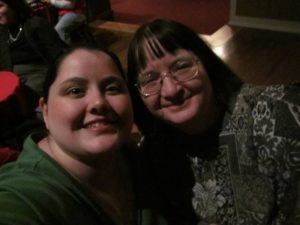My mother has attended more of my comedy shows than anyone else in my family. One time, I decided it would be fun to take her to a show in Muncie, Indiana. Muncie is a college town known for good audiences. At the time my mother used a cane to get around. I didn’t think about her mobility issues until we were at the venue staring up a flight of stairs. My mother persevered and muscled her way up the stairs very, very slowly. Once we got her settled upstairs, I had to run up and downstairs to get her food and drinks. Then at the end of the night we had to wait for everyone to leave so she could begin her slow, painful descent down to the main floor so we could drive home. 
I was embarrassed that I had not called ahead to verify that the showroom was easily accessible. I felt bad that she had to apologize to the people behind her because she had to stop every few steps to catch her breath. I felt sad because I knew that if I performed at that room again; she couldn’t come.
Stand-up comedy thrives on small rooms. We’re willing to put on shows wherever a anyone will let us. The attic, the basement, awkward side rooms, tall stages without steps. Unknowingly we’ve been leaving a lot of people out of the jokes. In the last seven years providing the comedy calendar, I have had numerous people insist that a venue is handicap accessible. And from a legal standpoint it is, but when I go into the venue, the space where the show is being held is usually the least accessible part of the building.
Mobility issues don’t just affect our audience members, they also can limit stage-time for performers with wheelchairs and other mobility issues. My first experience of this issue was when I met Ally Bruener at a comedy contest where they moved the show to the second floor of the venue. Ally uses a wheelchair and had to get volunteers carry her and her chair upstairs to be able to participate in the contest. Here is her response when asked about accessibility issues as a comedian:
“Accessibility, as a comic, isn’t just about whether or not I can get into a building. I have to consider the entire path from my van to the stage. A venue claiming to be accessible rarely acknowledges that I’m expected to bring my own portable ramps that may not even work, depending on the height of the stage. Access to the green room may seem like a luxury to most, but it’s often the only space I can occupy that doesn’t put me in a server’s way. Even getting from the green room to the stage is often an obstacle course of narrow aisles and minimal visibility.”
Here are some ways to help improve accessibility:
- When choosing a space to have your show, try to be mindful of whether or not that space welcomes everyone. (Hoosier Comedy would like to give a shout out to the White Rabbit Cabaret for its highly accessible design for both patrons and performers).
- If your venue has an accessible space and a non-accessible space, ask if you can have your show in the more accessible space or rotate into the accessible space periodically.
- Consider if the venue has ramps, a green room space, and if the stage height might be prohibitive to mobile ramps or people with reduced mobility.
- Choose your equipment with accessibility in mind. Some comics may not be able to get the microphone from the mic stand or hold it in their hands; consider a hands free headset as an equipment option.
- As an emcee, be sure to learn what each comic’s needs are well in advance of show time.
- If you are in a venue and discover it does not accommodate a performer’s needs, do everything you can to make the space work for your performer. You may have to bring the the microphone down to floor level, hold the mic during the set, or re-arrange the room in advance to ensure there is an adequately sized aisle for the comic to move in and out of the space.
- For the audience, provide photos of your venue on your social media. This can help people see if the venue is accessible for them. When you promote a room, be sure to be open about your show room’s accessibility, or lack thereof.
- If you discover that someone cannot attend or participate in your show because they cannot access the space, provide them the name of another venue that can accommodate their needs.
- Speak up and let the business owner know if their space design is turning away business because it is not accessible.
